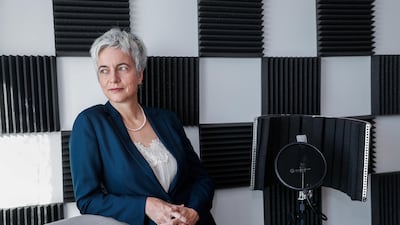There are not many mediums that allow for a 30-minute deep dive into a subject's personal history, yet if there was anywhere that could benefit from this sort of depth, it's here in the UAE, reasons Nathalie Gillet.
In March, the veteran French journalist launched her new audio podcast, Emirati Stories. She plans monthly interviews with local personalities contributing across a variety of sectors in the UAE, including the arts, business, science, politics and culture. Due to the focus of podcasting, and the intimate environment that it creates, Gillet can quiz her guests about their passions, childhoods, life paths, roots, motivations and key influences in a way that is not possible on other platforms.
"That's something I've been thinking of for a while," she says. "I just realised that so many expats live here for a year and then they go home and feel they've missed out on the local culture. You just don't get exposed to it that much."
Even though Emiratis and expatriates cross paths regularly, such as working in the same office, it’s not often people sit down and speak about deep issues, and this is relevant across the world.
“These things take time,” she says. “That’s the spirit behind it – to sit down with Emirati people who impress me for one reason or another, and ask them questions that you wouldn’t dare ask after 10 minutes of talking.”
She’d also like international listeners to tune in to promote more cross-cultural understanding. “I want them to feel like an Emirati person for a few minutes and relate to someone on the other end of the world,” she says.
A resident of Abu Dhabi for more than a decade, Gillet has studied Arabic and lived in several Arab countries, including Syria and Libya. Working as a journalist, she has honed her video and audio skills – which prepared her for the increasingly popular but decidedly solo world of podcasting.
“I got introduced to the audio format, and actually, that’s the format I prefer,” she says. “There’s some beauty and you get to the person’s emotions. In the written format, it’s more difficult to get to that stage.”
She scouts events to find her subjects, meeting with her first guest, Leila Al Marashi, at last year's Abu Dhabi Art. Al Marashi lives in Dubai and works in the corporate communications in the energy sector in Abu Dhabi, actively participates in breast cancer awareness and is also an artist. Her eye-catching The Power of Pink exhibition at the art fair was presented in the form of a bedroom.
"That was an interactive timeline," she explained in the March 1 podcast. "Where each wall of the bedroom would be telling the story of a decade of my life." Gillet appreciated that the artist was trusting enough to participate in the podcast before it had a formal platform. "There was so much content and so many interesting things," she says. "She speaks about her mum and dad, how they met, how her mother's parents met. I didn't expect her to tell me so much, she was very generous with that."
April's subject was a Sorbonne University Abu Dhabi student named Suhaila. "I liked her profile because she's run several elections," Gillet explains. "To me she is a new generation in a country that's opening up to public representation."
The most recent podcast hosts Jalal Luqman, the mixed media artist and author of the six-part graphic novel series The Armagondas, who she met at the Abu Dhabi book fair.
Up next on the podcast are a female mountaineer and a poet from Sharjah.
"At the end of our interview, I asked him to recite one of his poems, and he says it in a very classical Arabic," Gillet says. "And while he was performing his poem, I put myself in the shoes of someone from France listening to this podcast. In this context, where we're surrounded by bad news from across the world, the Arabic language represents something different."
________________
Read more:
Portrait of a Nation: Emirati doctor and inventor helps people reconnect with the 'rhythms of life'
Recycling in UAE: 'I don't want my bright green straw ending up wedged in some turtle’s nose'
________________
Gillet, who records at a studio she created in her house and funds the entire operation herself, dreams of eventually leaving the more accessible stories to work on and create those that would require a budget and an interpreter.
"I'd love to be able to interview someone who can tell me about how the country was formed and tell me about the tribes and the way people used to live before all those buildings," she says. "I'd love to interview an old grandma in the mountains of Fujairah."
To learn more about Emirati Stories, visit www.emiratistories.com

